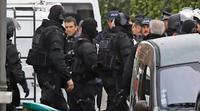-
CHINA WATCHChina’s Extensive Use of Genetic Information Sounds a Warning
As China increasingly relies on biometric data collection for public and national security purposes, it is time for democracies to address its role in their systems.
-
-
ConspiraciesThe effects of conspiracy theories
As a global population we are awash with conspiracy theories. They have permeated every major event, across every level of society; from the French Revolution to the War on Terror. They have attracted devotees in their millions — from lone survivalists to presidential nominees such as Donald Trump. But what effects do conspiracy theories really have on the public as we go about our day-to-day lives? Are they merely harmless flights of fancy propagated by those existing on the margins of society, or is their reach altogether more sinister? Do runaway conspiracy theories influence politicians, decision-makers and, by extension, the public at large? And what effect has the advent of the Internet and mass, instant communication across social media platforms had on the spread of conspiracy theories around the world?
-
-
SurveillanceYahoo stealthily scanned customer e-mails on behalf of U.S. intelligence agencies

A report on Tuesday accuses Yahoo of secretly building a customized software program to search all of its customers’ incoming e-mails for specific information provided by the U.S. intelligence company. The company, complying with classified NSA and FBI directives, scanned hundreds of millions of Yahoo Mail accounts. Yahoo is the first U.S. Internet company to agree to such a blanket request.
-
-
European security Germany to search refugees' phones to establish identity, spot suspicious connections

German interior minister Thomas de Maizière will next week announce a new German anti-terror steps, which, among other things, will require refugees and asylum-seekers arriving in Germany without a passport to surrender their smartphones – and all the passwords and security pin numbers associated with the phones – so German security agencies could check the owners’ social media accounts. The security services in Denmark, Norway, Sweden, and the Netherlands already routinely examine refugees’ mobile phones to establish a refugee’s identity.
-
-
SurveillanceNo technological replacement exists for bulk data collection: Report
No software-based technique can fully replace the bulk collection of signals intelligence, but methods can be developed more effectively to conduct targeted collection and to control the usage of collected data, says a new report from the National Research Council. Automated systems for isolating collected data, restricting queries that can be made against those data, and auditing usage of the data can help to enforce privacy protections and allay some civil liberty concerns, the unclassified report says.
-
-
SurveillanceKeeping citizens safe while respecting their right to privacy
Surveillance is an increasingly common – and sometimes controversial – activity, designed fundamentally to protect public and property. The rapid increase in information gathered by surveillance cameras however has led to spiraling costs in terms of storage filtering and data checking, and has also led to concerns that innocent citizens are routinely being tracked. Using innovative new technology, EU-funded researchers have reconciled the need for robust surveillance with the right to privacy.
-
-
Insider threatIdentifying, thwarting insider threats before they do damage
Researchers argue that one way to identify and predict potential insider threats even before these individuals begin to do damage like stealing and leaking sensitive information, is by using Big Data to monitor changes in behavior patterns. Researchers at PARC, for example, found that individuals who exhibit sudden decrease in participation in group activity, whether in a game like World of Warcraft or corporate e-mail communications, are likely to withdraw from the organization. A withdrawal represents dissatisfaction with the organization, a common trait of individuals who are likely to engage in insider security breaches.
-
-
SurveillanceA first: Judge in terrorism case rules defense may examine government secret FISA application
U.S. District Judge Sharon Johnson Coleman ruled yesterday (Wednesday) that the U.S. government cannot keep secret its request to conduct clandestine surveillance of an accused would-be terrorist. The ruling gives defense attorneys an unprecedented access to a request made to the Foreign Intelligence Surveillance Act (FISA) court for permission to spy on an American citizen. Judge Coleman said her ruling is the first time a defendant’s lawyers will be given access to an application prosecutors submitted to the FISA court. Security experts warned that opening FISA applications to review in a criminal case may set a dangerous precedent.
-
-
SurveillanceExpert calls for “surveillance minimization” to restore public trust
Surveillance minimization — where surveillance is the exception, not the rule — could help rebuild public trust following revelations about the collection of personal data, according to an expert on privacy and surveillance. “Surveillance minimization requires surveillance to be targeted rather than universal, controlled and warranted at the point of data gathering rather than of data access, and performed for the minimum necessary time on the minimum necessary people,” he says.
-
-
SurveillanceJudge denies defense request to see whether NSA surveillance led to terrorism charges
U.S. District Judge Sharon Johnson Coleman on Friday ruled that lawyers for Adel Daoud, a 20-year old resident of Hillside, a suburb west of Chicago, who was charged with plotting to set off a powerful bomb outside a crowded Chicago bar, will not be allowed to examine whether the investigators who initiated the sting operation which led to Doud’s arrest relied on information gleaned from NSA surveillance programs. Attorneys for Daoud had asked Judge Coleman to instruct prosecutors to disclose “any and all” surveillance information used in Daoud’s case, including information disclosed to a U.S. Senate’s Select Committee on Intelligence. In a brief ruling posted late Friday, Coleman denied the motion, writing that the defense had “failed to provide any basis for issuing such an order.” Prosecutors would not confirm whether the FBI had initiated its operation against Doud as a result of a tip from the NSA, but they did say that even if such surveillance did exist, they have no plans of using it at trial and the defense was not entitled to it.
-
-
SurveillanceDeclassified documents strongly argue for keeping NSA programs secret
On Saturday, James Clapper, the Director of National Intelligence, declassified a set of ten court documents which show that both the Bush and Obama administrations assert that that some of the more sensitive NSA surveillance programs should be kept secret. The administration declassified the documents following a court order related to two lawsuits filed the Electronic Frontier Foundation. The Bush and Obama administration strenuously reject the EFF’s charge that they were running a “dragnet surveillance.” Both administrations contend that the collection programs with explicit limits and minimization procedures which effectively protected the Constitutional rights of Americans.
-
-
Secret agentsJames Bond drank too much to perform at the level depicted in books, movies
A detailed examination of James Bond’s books shows that Bond’s weekly alcohol intake is over four times the recommended limit for an adult male, putting him at high risk of several alcohol related diseases, such as alcoholic liver disease, cirrhosis, impotence, and alcohol-induced tremor, and an early death. The medical team concluded that it would not be realistic to expect Bond to have the capacity to perform (in all aspects of life) at his high level of alcohol intake.
-
-
SurveillanceA civilian may be appointed to head the NSA
The Obama administration is considering appointing a civilian to lead the National Security Agency (NSA). If carried out, the move would install a civilian to lead the agency for the first time since its founding in 1952. Keith Alexander, the current director of the NSA, is a four-star Army general. He plans to retire next spring.
-
-
Securing the cloudCloud OS for the U.S. intelligence community
Cloud management specialist Adaptive Computingis partnering with the investment arm of the CIA, In-Q-Tel, to develop a cloud operating system for use by U.S. intelligence agency
-
-
TerrorismFrance debates its anti-terror approach

The French are debating their anti-terrorism policies in the wake of the worst terrorist attacks on French soil; the debate centers on whether or not the authorities have the right approach to combating terrorism
-
- All
- Regional
- Water
- Biometrics
- Borders/Immig
- Business
- Cybersecurity
- Detection
- Disasters
- Government
- Infrastructure
- International
- Public health
- Public Safety
- Communication interoperabillity
- Emergency services
- Emergency medical services
- Fire
- First response
- IEDs
- Law Enforcement
- Law Enforcement Technology
- Military technology
- Nonlethal weapons
- Nuclear weapons
- Personal protection equipment
- Police
- Notification /alert systems
- Situational awareness
- Weapons systems
- Sci-Tech
- Sector Reports
- Surveillance
- Transportation
Advertising & Marketing: advertise@newswirepubs.com
Editorial: editor@newswirepubs.com
General: info@newswirepubs.com
2010-2011 © News Wire Publications, LLC News Wire Publications, LLC
220 Old Country Road | Suite 200 | Mineola | New York | 11501
Permissions and Policies
Editorial: editor@newswirepubs.com
General: info@newswirepubs.com
2010-2011 © News Wire Publications, LLC News Wire Publications, LLC
220 Old Country Road | Suite 200 | Mineola | New York | 11501
Permissions and Policies
